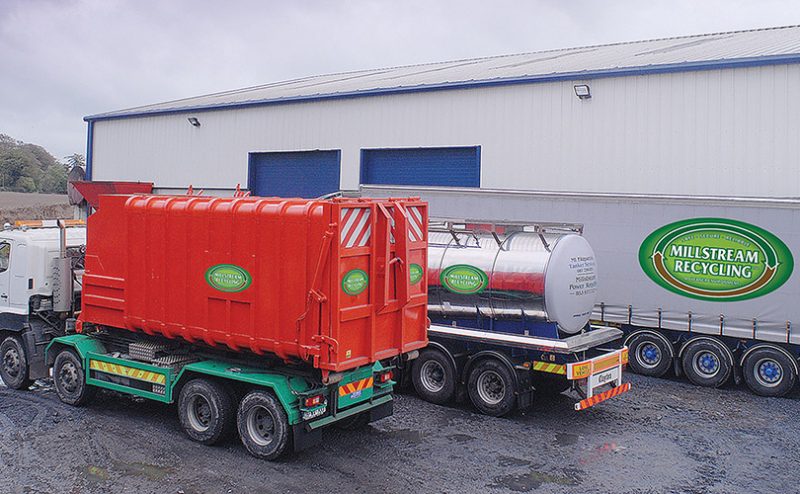
For coming up on three decades, Millstream Animal Feed has been helping Irish farmers improve their bottom line by providing a game-changing range of ingenious high-performance, low-cost feed alternatives. We returned to Clohamon Mills in County Wexford and touched base with Head of Sales Charlie Hogg to discuss three of the value-added products currently available.
Through long term partnerships with food factories and bakeries for valorising their high feed value by-products, Millstream Animal Feed supplies farmers the length and breadth of Ireland with rich, low cost alternative feeds that have a significant positive impact on the profitability of their enterprises by reducing costs of production.
At present, Millstream Animal Feed is reporting increased availability on two of its most in-demand products – Bread and Oat Hulls – while their recently-developed milk replacer also offers farmers an exceptional high-quality product at an excellent price.
“Our Bread is a mixture of surplus produce – rolls, sliced pans, dough, etc. – collected daily from bakeries,” says Charlie Hogg, Head of Sales. “It’s very fresh and high quality. It will have been rejected because it hasn’t come up to the required specification for human consumption. Maybe the shape could be very slightly off, or something.
“We take it back to our premises in Wexford. We sell the Bread in 30-tonne loads to beef and dairy farmers. It’s particularly good for fattening cattle. It’s very high in starch (38%) %DM and protein.
“As the Bread is cooked, it’s very digestible and the animal gets great usage out of it. Compared to using meal, it’s very well priced, offering a good opportunity to farmers to lower their feed costs.”
Availability of Bread is subject to seasonal demand but there is generally a good supply during the summer months. An excellent complement to long fibre feeds such as hay, silage and straw, it is easy to mix in diet feeders. “Farmers can pit it with silage, wheat, potatoes or brewer’s grains or you can put it in a dry store where it will keep for six weeks,” adds Charlie. “In my experience, once a farmer starts using this product, he never goes back.”
Because they have a higher passage rate through the animal, Oat Hulls – which are delivered in 21-tonne bulk artic tippers – often outperform other sources of fibre in the diet. A by-product of milling, these are very cheap compared to soya hulls and are very high in fibre (29%). Oat Hulls can make up to 45% of the ration and are far more palatable than other roughages.
“They are very high in dry matter and are ideal if the farmer is pitting wet mixes and needs something to soak up moisture run-off. You can pit it with beet, brewer’s grain and potatoes and it’s very good for stretching out silage if they are short on silage.
“We have additional supply of both those products available at the minute and these are ideal for farmers who are looking to reduce their feed costs,” Charlie continues. “Feed is a major cost of production for farmers and any decrease in that cost can have a big impact on their profit margins.”
But it’s not all about cost as Millstream Animal Feed’s high-performance products bring other benefits, too. While the competitive advantages of feeding keenly-priced former foodstuffs to livestock are obvious, other key benefits of the alternative feeds produced include consistency, high digestibility, high energy, improved palatability, enhanced feed intake and enhanced nutrition.
“I can’t emphasise enough the benefit of higher digestibility, such as that found in the Bread,” Charlie stresses. “It’s so much more digestible than wheat or barley that the animal can extract real value out of it. Some farmers are inclined to just look at price V protein and dry matter, which isn’t always the best way to measure the value of animal feed. The protein is of no use if the animal can’t digest it or struggles to do so. The more digestible a product is, the better.”
Approved by The Department of Agriculture, An Bord Bia and QS, Millstream Animal Feed have also achieved the highest level of conformity with FEMAS (the Feed Materials Assurance Scheme), which guarantees that their feeds are collected, processed and supplied to the very highest standards.
With a regular customer base established from Donegal to Kerry and more farmers becoming aware of the benefits of their value-added, high-performance alternative feeds, this pioneering, sustainable family business is going from strength to strength some 28 years on from its inception.
Another unique product offering significant financial and performance gains to farmers is their milk replacer for calves, which is developed in-house: “This has two major advantages over standard milk replacer that’s bought off the shelf,” Charlie points out.
“First of all, ours is cheaper than standard milk replacer. We can supply it cheaper because it’s an Irish product which we make in Ireland using raw materials sourced locally. Secondly, most other milk replacers for calves have inferior ingredients, such as wheat protein, soya protein or gluten – which are cheaper sources of protein – added in.
“Only dairy powder goes into ours. Because it’s all natural milk protein, it is superior and easier to digest. While other milk replacers use inferior cheaper vegetable proteins to bump up its protein value, as ours genuinely contains only milk ingredients it is a more natural product and more similar to whole milk.
“As with our feeds, it is a better product at a cheaper price,” the Wexford man concludes. “It’s sourced locally by a small company with less overheads and those savings are passed on to the farmer.”
Millstream Animal Feed,
Clohamon Mills,
Bunclody,
County Wexford.
Tel: 053 93 77323
Fax: 053 93 76031
Email: [email protected]
Web: www.millstreamrecycling.ie
First published in Irish Tractor & Agri magazine Vol 11 No 5, October/November 2023